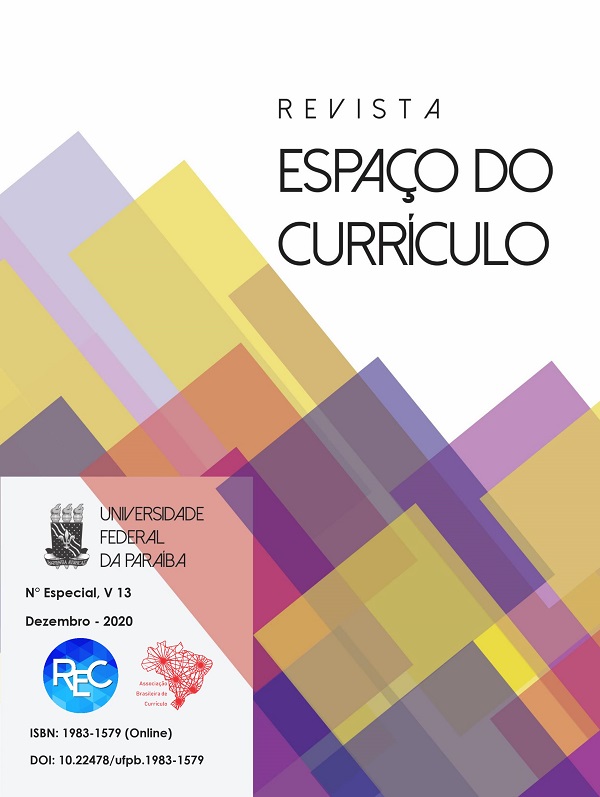THE THE CONCEPT OF TEACHERS CREATIVITY
urgent demands for times of absence
DOI:
https://doi.org/10.22478/ufpb.1983-1579.2020v13nEspecial.54574Keywords:
Teachers Creativity, Self-training, School Reinvention, Emergencial remote educationAbstract
The concept of teaching creativity and the imposition for a reinvention of the school and its professionals in the current context is the starting point of this article. In the first part, the concept of teaching creativity will be presented as a space for listening and reflection, a theoretical construct based on the product of the doctoral thesis of one of the authors, which seeks to understand the teaching self-training processes and how teacher creativity is favored when he experiences training spaces in which listening and reflection are present. In the second part, will be discussed the pandemic educational context, experienced on a world scale in 2020 and the demands arising from the reinvention of the school and its teachers. Some points of tension will be evidenced in relation to the new structures created and in the resignifications arising from what is understood here as virtuality of the classroom and teaching work. The need to be a teacher, even in adversity, created spaces for creation that were often not favorable for many teachers. The search for creative responses from these professionals, who often present themselves as “pedagogical gambiarras”, emerges as factors that prove the urgency of the discussion about creativity as a teacher training theme. As a finalization of the analysis, will be presented some ways to have creativity in adverse contexts.
Downloads
Metrics
References
ALVES, R. O velho que acordou o menino. São Paulo: Planeta, 2015.
ANDRADE, D. A reestruturação do trabalho docente: Precarização e flexibilização. Educação e Sociedade, Campinas, vol. 25, n. 89, p. 1127-1144, Set./Dez. 2004.
ARROYO, M. Políticas Educacionais e desigualdades: à procura de novos significados. Educ. Soc., Campinas, v. 31, n. 113, p. 1381-1416, out.-dez. 2010
BACICH, L.; TANZI, A.; TREVISANI, F. Ensino híbrido: personalização e tecnologia na educação ( recurso eletrônico). Porto Alegre: Penso, 2015. e-PUB.
BARBOSA, L. Homeschooling no Brasil: ampliação do direito à educação ou via de privatização? Educ. Soc., Campinas, v. 37, nº. 134, p.153-168, jan.-mar., 2016
CANDAU, V. M. Universidade e formação de professores que rumos tomar? In: CANDAU, V. M. Magistério: construção cotidiana. Petrópolis: Vozes, 2011a. p. 29-50.
CANDAU, V. M. Formação Continuada de professores: tendências atuais. In: CANDAU, V. M. Magistério: construção cotidiana. Petrópolis: Vozes, 2011b. p. 51-68.
CHANTRAINE-DEMAILLY, L. Modelos de formação contínua e estratégias de mudança. In: NÓVOA, A. Os professores e a sua formação. Lisboa: Publicações Dom Quixote, 1992. Cap. 7, p. 139-158.
COCHRAN-SMITH, M. A tale of two teachers: Learning of teach over time. In: Kappa Delta pi Record, july-sept, 2012 (p. 108-122). Tradução: GEPED (Grupo de Estudos e Pesquisas em Didática e Formação de Professores),2005.
FERNÁNDEZ, A. Os idiomas do aprendente. Porto Alegre: ARTMED, 2001.
GARCÍA, C. M. A formação de professores: novas perspectivas baseadas na investigação sobre o pensamento do professor. In: NÓVOA, A. Os professores e a sua formação. Lisboa: Publicações Dom Quixote, 1992. p. 51-76.
HORN, Michel. B.; Staker, H. Blended: usando a inovação disruptiva para aprimorar a educação. Porto Alegre: Penso, 2015.
JESUS, S. N. A motivação para a profissão docente. Contributo para a clarificação de situações de mal-estar e para a fundamentação de estratégias de formação de professores. Aveiro: Estante Editora,1996
JOSSO, M.-C. Experiências de Vida e Formação. São Paulo: Cortez, 2004.
LOPES, A; DIAS, R; ABREU, R. Discursos nas políticas de currículo. Rio de Janeiro: Quartet,2011.
MARTINEZ, A. M. A criatividade na escola: três direções de trabalho. Linhas Críticas, Brasília, 8, 2002. 189-206.
MEDIANO, Z. D. A formação em serviço de professores através de oficinas pedagógicas. In: CANDAU, V. M. Magistério: construção cotidiana. Petrópolis: Vozes, 2011. p. 91-108.
NASCIMENTO, M. D. G. A formação continuada dos professores: modelos, dimensões e problemática. In: CANDAU, V. M. Magistério: construção cotidiana. Petrópolis: Vozes, 2011. p. 69-90.
NÓVOA, A. Formação de professores e profissão docente. In: NÓVOA, A. Os professores e a sua formação. Lisboa: Publicações Dom Quixote, 1992. p. 15-34.
NÓVOA, A. Prefácio. In: JOSSO, M-C. Experiências de vida e formação. São Paulo: Cortez, 2004. p. 11-17.
SILVA, T. Documentos de Identidade: uma introdução às teorias do currículo. Belo Horizonte: Autêntica, 2007.
STÜHLER, G. D.; ASSIS, M. D. P. Relações interpessoais: construindo um clima institucional positivo na escola. In: CANEN, A.; SANTOS, A. R. Educação multicultural: teoria e prática para professores e gestores em educação. Rio de Janeiro: Ciência Moderna, 2009.
RAUSCH, R. B. Professor-pesquisador: concepções e práticas de mestres que atuam na educação básica. Revista Diálogo Educacional, Curitiba, 12, set./dez., 2012, 701-717.
TARDIF, M. Saberes Docentes e Formação Profissional. Petrópolis: Vozes, 2014.
TORRE, S. D. L. Da Identificação à Criatividade Paradoxal - dialogando com a Criatividade. São Paulo: Madras, 2005.
TORRE, S. D. L. Criatividade Aplicada - Recursos para uma formação criativa. São Paulo: Madras, 2008.
VALENTE, J.A. Educação à distância: criando abordagens educacionais que possibilitam a construção de conhecimento. In: VALENTE, J. A; MORAN, J; ARANTES, V. (org). Educação à distância: pontos e contrapontos. São Paulo: Summus, 2011. p.13-31.
WINNICOTT, D. W. A família e o desenvolvimento individual. Rio de Janeiro: Imago, 1965.
WINNICOTT, D. W. O brincar e a realidade. Rio de Janeiro: Imago, 1975.
Downloads
Published
How to Cite
Issue
Section
License
Copyright (c) 2020 Curriculum Space Journal

This work is licensed under a Creative Commons Attribution 4.0 International License.
By submitting an article to Curriculum Space Journal (CSJ) and having it approved, the authors agree to assign, without remuneration, the following rights to Curriculum Space Journal: first publication rights and permission for CSJ to redistribute this article. article and its metadata to the indexing and reference services that its editors deem appropriate.
















